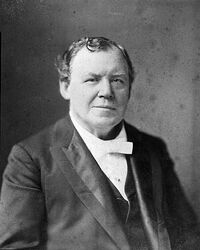No edit summary |
Tags: Visual edit apiedit |
||
| Line 11: | Line 11: | ||
==Atlantis: The Antediluvian World== |
==Atlantis: The Antediluvian World== |
||
| − | In 1882, Donnelly published the book ''Atlantis: The Antediluvian World''. It was one of the few publications that perceived the lost continent as being real and further took the account of [[Plato]] to be fact. His book would apply his theories of Atlantis being the root source of all civilizations and would also introduce the Lemuria theory in arguing that Atlantis was a continent that connected with the Americas, Europe, and Africa. |
||
| − | |||
| − | Donnelly's book would become the source of many modern-day theories and concepts of Atlantis. Though he had his expected detractors, he found support from the likes of Helena Blavatsky, the Theosophical Society, and Rudolf Steiner. His theories would also be the inspiration for Edgar Cayce, as the book would help him understand the visions he perceived to be that of Atlantis. |
||
==See also== |
==See also== |
||
Revision as of 00:33, 13 May 2015

Ignatius Donnelly (c.3 November 1831-1 January 1901) was a U.S. Congressman from Minnesota, populist writer, and amateur scientist. He is well known for his theories on Catastrophism, Shakespeare authorship, and perhaps most notably Atlantis. He is recognized as one of the more prominent Keepers of the Journal.
Obtaining the Journal
In 1862, Donnelly traveled to England and visited the British Museum. Upon seeing the Shepherd's Journal, he was able to secure a loan of it. He would later flee to his ancestry country of Ireland, using his diplomatic immunity to prevent his having to return to England.
While in Ireland, he attempted to study the Journal. While it is believed that he was not successful in translating all of its contents, he was able to understand certain ideas of Atlantean culture. In particular, he perceived the notion that all ancient and present civilizations are rooted from the lost continent.
For whatever reason, Donnelly would make a stop in Iceland. Furthermore, he would leave the Journal there. Some believe he merely lost it, others wondered if he felt it belonged. Regardless, the Journal would actually be considered lost for many decades as a result.